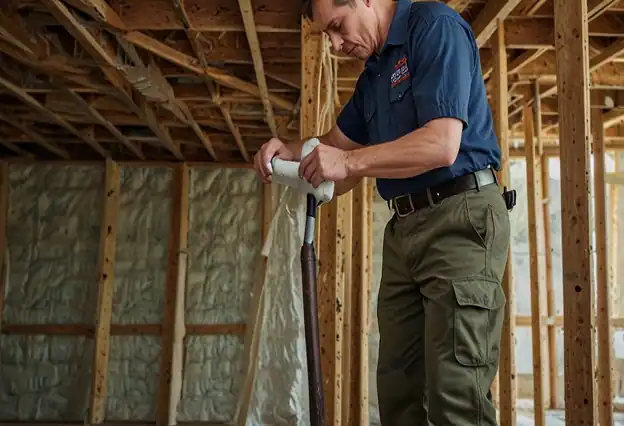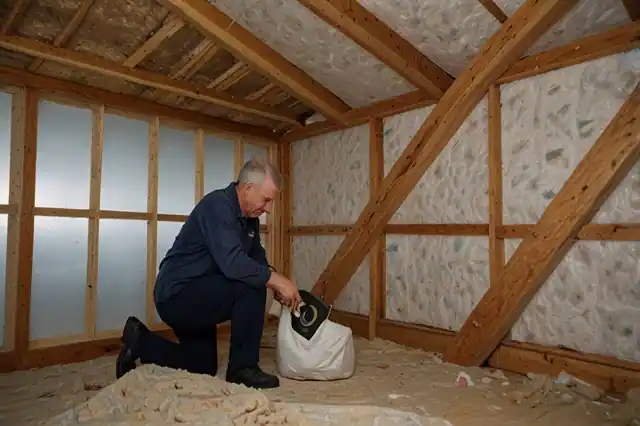Home insulation is essential for keeping your house cool in the summer and warm in the winter, which has a direct effect on your comfort, well-being, and energy efficiency. If your house is not properly insulated, you might be losing valuable heat or cool air, which would result in high monthly energy bills. For Veterans, upgrading insulation can be a major financial burden, particularly for those with service-connected disabilities or on fixed incomes.
Fortunately, there are a number of government and nonprofit programs in the U.S. that provide veterans with grants for home insulation. The goal of these programs is to lower long-term energy costs while simultaneously improving the safety, comfort, and energy efficiency of homes.
This guide will discuss the best insulation assistance programs for Veterans in 2025, including eligibility requirements, grant amounts, and application procedures. This post contains all the information you need to get started, regardless of whether you are a disabled veteran, an elderly veteran, or someone simply trying to save money on energy bills.
Why Veterans Should Prioritize Home Insulation
Financial Savings and Energy Efficiency
One of the main causes of excessive energy costs is inadequate insulation. According to the U.S. Department of Energy, homeowners who upgrade their insulation can reduce their heating and cooling expenses by up to 20%. For the typical household, that amounts to $200 to $500 annually.
For veterans receiving disability benefits or low income, these savings can have a significant impact. Insulation keeps your house cooler in the summer and lessens heat loss in the winter without putting too much strain on your air conditioning system.
Benefits to Comfort and Health
Your health may be impacted by cold drafts mold growth or moisture accumulation in uninsulated or inadequately insulated homes. For elderly veterans or those with respiratory disorders, this is particularly concerning.
Increased Home Value
Modernizing your insulation is a wise long-term investment. If you intend to sell or pass your house on improved insulation raises the value of your house and attracts more buyers.
Read- How Free Window Replacement Grants Can Improve Home Insulation
Weatherization Assistance Program (WAP)
What It Is:
One federal initiative from the U. S. Department of Energy (DOE) is the Weatherization Assistance Program (WAP). Through home improvements, this program assists low-income households, including veterans, in lowering their energy consumption.
What’s Covered:
Insulating the walls and attic
air sealing (leaks, cracks, and gaps)
Repairing and sealing ductwork
Ventilation Improvements
Upgrades to the water heater and furnace (if necessary)
Who Is Eligible?
Income that is 200 percent of the federal poverty level or less
If receiving SSI, LIHEAP, or specific VA benefits, one is automatically eligible
Seniors, people with disabilities, and veterans are given priority
Average Grant Amount:
Depending on the condition and extent of the work, each home may cost up to $8,000
How to Apply:
Check out the website of the weatherization office in your state.
Fill out the application by providing proof of your veteran status and income.
Get a free energy audit for your house.
Certified weatherization contractors will do the work.
Click here to locate your nearby WAP provider.
VA Specially Adapted Housing (SAH) Grant
What it is:
Administered by the Department of Veterans Affairs, the SAH Grant assists veterans with severe service-connected disabilities in improving the livability of their homes. This includes any necessary insulation upgrades for accessibility or medical comfort.
What is Covered:
Insulation and improvements to the HVAC system
Modifications to the structure
doors and windows that use less energy
Safety improvements enlarged doorways and ramps
Read- Energy Efficient Upgrades by HUD Home Improvement Grants
Who qualifies:
Veterans who have complete and permanent disabilities related to their service, such as:
Loss of limb function
Serious burns
Specific respiratory injuries
Must be the homeowner or have plans to build one.
2025 Grant Amount:
As much as $117,014
How to Apply:
Complete Form 26-4555 of the VA.
Use the VA’s eBenefits portal to submit an online application.
Hire a contractor who has been approved by the VA.
Information about the SAH Grant on VA.gov
Read- Free Window Replacement Grants For Low-Income Veterans
LIHEAP Energy Crisis Support and Weatherization
What It is:
The Low-Income Home Energy Assistance Program (LIHEAP) provides weatherization services and assistance with utility bills to lower energy expenses. This program is also used in many states to provide emergency insulation repairs.
What is Covered:
Upgrades to the insulation that are not too extensive
Caulking, sealing, and Weatherstripping
Repairs or maintenance for furnaces
Emergency services during extreme weather conditions
Who Is Eligible:
Households that are low-income with priority for:
Seniors
disabled people
Veterans who are on VA pensions or disability
Both homeowners and renters may be eligible.
Average Grant Amount:
$500 to $1,000, depending on the state program and need
Instructions For Applying:
Apply online via your state’s energy assistance website or get in touch with your local LIHEAP office.
Send in utility bills and proof of income.
If necessary, schedule an energy audit.
Click this link to locate your state LIHEAP office.
Read- Free Home Improvement Grants Assistance For Low-Income Families
State-Level Veteran Programs and Insulation Grants
Numerous states have their own programs for weatherization or insulation assistance. Among these are veterans’ priority access or special funding. Here are some instances:
California:
Insulation upgrades are free under the Energy Savings Assistance Program (ESA)
Veterans are automatically eligible if they meet certain income thresholds.
Benefit maximum: $7500 per household
New York:
Empower NY1 and the Home Energy Assistance Program (HEAP).
Includes energy-efficient appliances, air sealing, and insulation
Priority is given to veterans who are disabled or have low incomes.
Texas:
Referrals to housing and energy efficiency services are available through the Texas Veterans Commission.
Possibly collaborating with nonprofits to offer insulation assistance
Veteran Discounts and Rebates from Utility Companies
Certain utility companies provide veterans with exclusive discounts or insulation rebates. Additional savings can be achieved by combining these with state or federal grants.
What to Look For:
Rebates for insulation on the floor, walls, or attic
Low-cost or free energy audits
Additional rewards for families of military personnel
Examples:
Up to $1,500 in insulation rebates are available from Pacific Gas & Electric (PG&E) in California.
Con Edison, Xcel Energy, and Duke Energy all provide comparable rebates across the country.
Additionally, veterans may be eligible for reduced utility costs
How to Apply:
Inquire about insulation rebate programs with your gas or electricity provider.
Find out if they have any specific discounts for veterans or the military.
For reimbursement, send in contractor information or receipts.
Support from Charities and Nonprofits
Veterans can receive assistance with home renovation projects such as installing insulation from a number of nonprofit organizations. These programs may provide free services and are frequently used by low-income or disabled veterans.
Top Organizations:
Rebuilding Together: provides free home insulation and other repairs.
Assists local contractors and veteran service organizations
Habitat for Humanity – Veterans Build: May include weatherization and insulation for eligible veterans
Focuses on homeowners with low incomes or disabilities
Operation Homefront: Provides support for transitional housing and emergency assistance
May assist with important home insulation or repairs
Amount of Typical Support:
$1,000 to over $10,000, based on the extent and availability of funds
Apply by contacting the community development office or your local chapter.
How to Get Started: Application Prep Tips
Prior to applying for any program, it is crucial to prepare and gather the necessary paperwork:
Most likely, you will need:
Veteran status documentation (VA card DD-214 form)
Pay stubs, tax returns, SSI or disability letters, or other documentation of income proof
Gas and electricity utility bills
Documents related to home ownership or a lease
Disability records (for SAH or programs that prioritize people with disabilities)
What to Do:
Get a home energy audit scheduled- Your local program may offer this for free.
Apply to more than one program- Many of them can be combined.
Keep track of your application- It may take a few weeks or several months to receive a response.
Be persistent- reapply or inquire about appeals if you are rejected once.
Common Criteria for Eligibility in All Programs
Veteran Status: Proof of military service is required
Income Limits: According to federal/state regulations and household size
Ownership: Some programs accept renters while others demand ownership.
Disability Documentation: Required for priority access or some VA grants
Type of Residence: Approval may be extended to single-family homes, apartments, and mobile homes.
Conclusion
The benefits of home insulation extend beyond reducing energy costs, they also enhance safety comfort and health. There are a number of valuable programs available to veterans in 2025 to assist with the cost of upgrading their insulation.
There is probably a program for which you are eligible, whether you are a low-income veteran using WAP, a disabled veteran applying for the VA SAH Grant, or you are researching utility company rebates.
It is important to begin now. Funding is frequently scarce, and application procedures can take some time. You can get the assistance you are entitled to by assembling the necessary paperwork and contacting the appropriate local organizations.